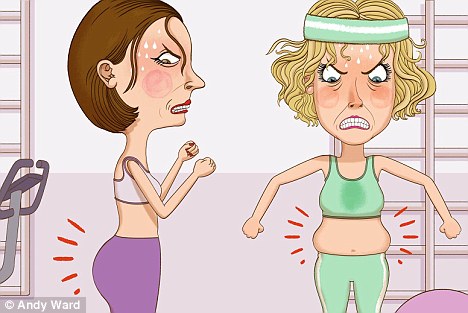
So what’s up with the peri-menopausal and menopausal bulge? It seems to appear overnight and is SUPER hard to get rid of. Read on to find out the scoop on this unwelcome guest.
There’s a strong hormonal component to abdominal weight gain. And in most people, that hormone is insulin which is a FAT storing hormone.
Think it doesn’t affect you? Well, insulin resistance is, in fact, very common, affecting more than 60% of adults over 40. And could be affecting you even if your doctor tells you that your blood sugar and HbA1c levels are normal. And that’s because these two markers will remain fairly steady for as much as a decade, while insulin levels rise and insulin resistance gains a foot-hold.
Now read this: Findings suggest that estrogen plays a role in keeping our cells sensitive to insulin as well as keeping inflammation in check. Which is why peri-menopausal and menopausal women’s metabolism often come to a screeching halt once estrogen starts to fall in peri-menopause and often becomes almost non-existent in menopause.
From a women’s health perspective, insulin resistance can make periods heavier when we are younger and increase the long-term risk of heart disease, dementia, diabetes, HBP, osteoporosis, and breast cancer as we get older.
Insulin resistance can also cause high cholesterol, high triglycerides and a fatty liver, which is fat accumulation in the liver. So, if you’ve been told you have a fatty liver, chances are you do have insulin resistance, even if your doctor never mentioned it.
And studies have shown that hormone replacement can reduce all of these.
Estrogen is heart protective, neuroprotective, keeps calcium in our bones, keeps us more insulin sensitive, and reduces inflammation and breast cancer, (which may come as a surprise to most).
Men: as testosterone declines and belly fat increases there is an inverse effect which causes insulin resistance.
So sex hormones (estrogen, progesterone, and testosterone) are a very important topic when we’re talking about overall well-being and health. They are not just for restoring our libido and reducing hot flashes and insomnia. They are an integral part of maintaining our vitality!
So what is insulin resistance? In simplest terms, insulin resistance is the dysfunction of the energy powerhouses in our cells that are supposed to turn food into energy. The result of this dysfunction is less energy, more inflammation, and a greater tendency to gain fat, especially around the middle.
If you have excess belly fat and elevated glucose and HA1c, your doctor will more than likely recommend you lose weight, eat less sugar and carbs, and exercise more.
But that doesn’t always work because if insulin is stuck on high, it causes weight gain, specifically abdominal or visceral fat. Remember, insulin is a fat storing hormone. So. Being told to “just lose weight” to fix the underlying metabolic problem that’s causing you to gain weight is putting the cart before the horse. A better approach is to identify insulin resistance, and then work to lower insulin, which will improve metabolic function and have the side benefit of being able to lose weight around the middle.
You can identify insulin resistance yourself, both from physical signs and lab work. Once you identify that you have it, then you can begin to work from the inside out. Click here to go to my POST that outlines this.
(if you don’t already own a scale that tracks visceral fat as well as muscle and fat, I suggest you purchase one. Tracking body composition is super important! Maybe even more important than weight. Here’s the scale I like).
I’ll be talking more about hormones and their benefits in subsequent posts.
Would you like to chat? For new clients, please schedule an introductory call HERE.